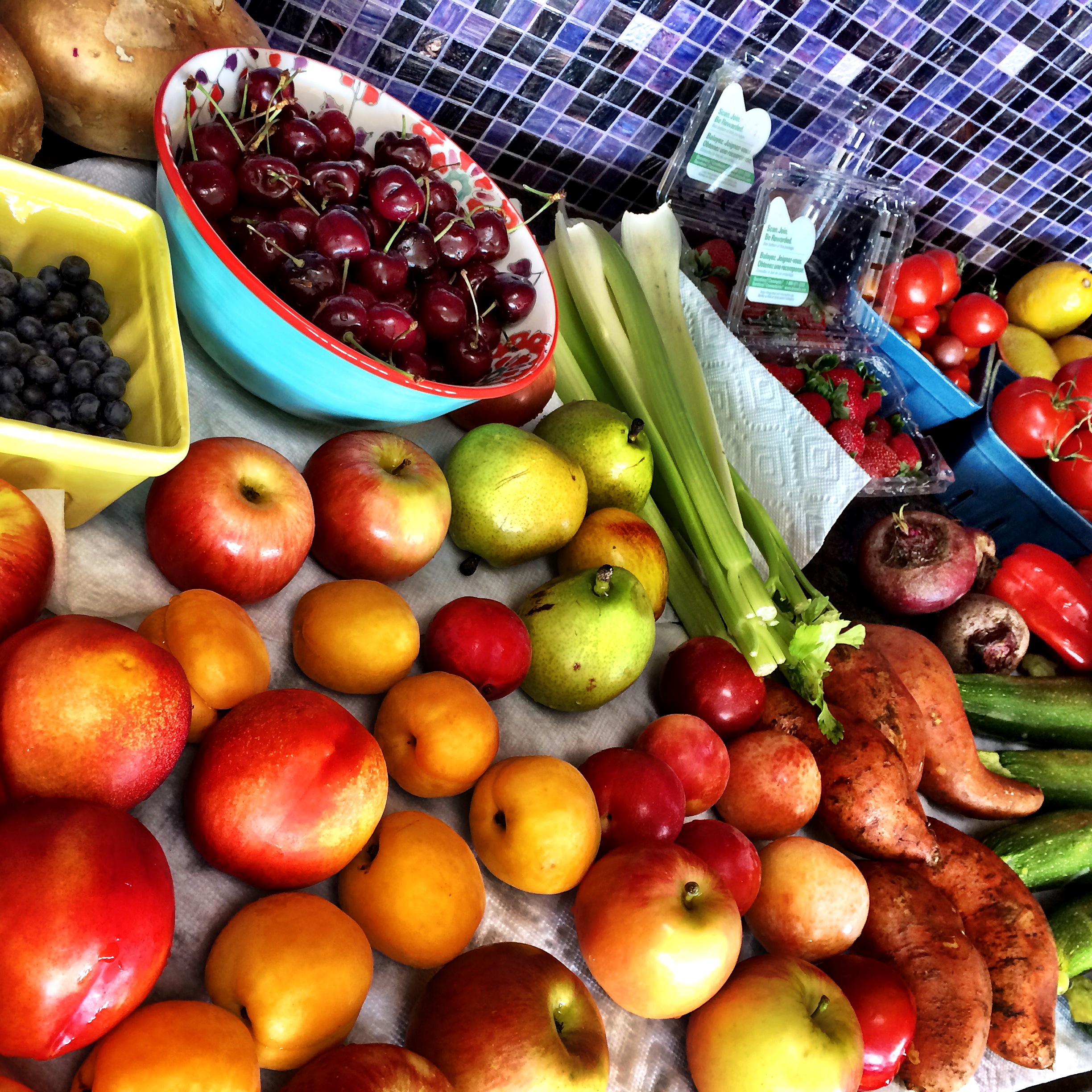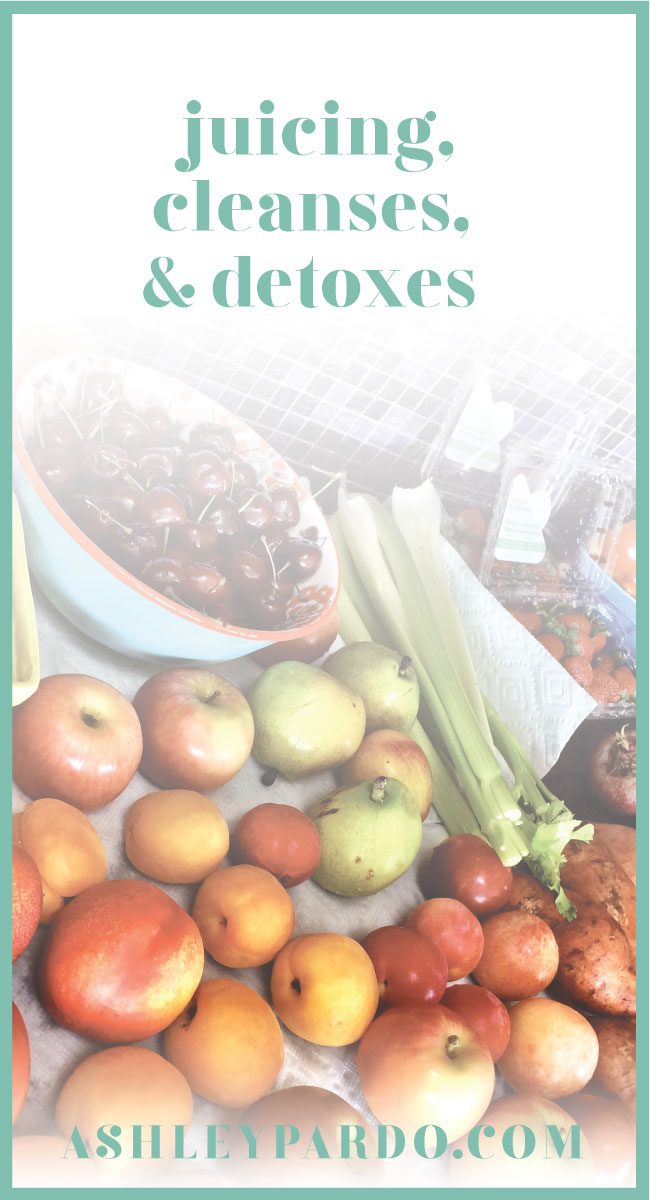Juicing, cleanses, & detoxes

I remember the firest moment I wanted to try a juice cleanse. It was five years ago, and I was convinced I had to lose ten pounds. I didn’t need to. Not eating food and drinking five really expensive, sugar-laden, zero-fiber juices per day seemed like a smart idea at the time.
Mind you, on the morning I began the juice cleanse, I was getting ready to leave for a doctor’s appointment. I was sipping on my juice while watching Dr. Lustig’s viral talk about sugar. The juice contained 39g of sugar. The irony is not lost on me.
While I was in the waiting room waiting for the doctor, I felt like I was going to faint. This was probably due to the fact that the juice contained zero fiber, protein, or fat (the ones later in the day had some fat, which slow the absorption of the sugar), so it was like injecting sugar straight into my veins.
Even though I had three days to go on the cleanse, spent over $100 on the juices, obsessed about it for weeks prior, and took up prime real estate in my parents’ fridge storing them, I stuffed my face with actual food the second I got home from the doctor because I felt like I was going to collapse and/or die.
Since then, I’ve never done another juice cleanse, nor have I given any thought to a repeat attempt. Even still, people around me and the general media proport that juicing and cleansing are the thing to do if you want to be healthy.
Why the obsession?
Films like “Forks over knives” highlight a man who ate pure junk and transitions to drinking only juices for 3 months and undergoes a significant transformation just adds to the popularity, hoopla, and curiosity of people who want to get healthier or more likely, lose all their weight fast.
It must be taken into consideration that people who go straight to juice after a lifetime of junk food will lose weight because, um, DUH. They went from eating food to not eating food. They’re eating juiced veggies! It should be said that their profound transformation does not come from the magic properties of juice, but rather the drastic dietary changes that took place.
I’m personally not a fan at all of juicing, cleansing, or detoxes because I think they promote the diet mentality. On or off. Black or white. We turn to juices and cleanses when we feel we’ve had too much, after a holiday, when we need to clean ourselves out. It promotes extremes. It doesn’t promote living in the grey area which I believe promotes dietary sustainability.
How would we define cleanse & detox?
A cleanse is a process or period of time during which a person attempts to rid the body of substances regarded as toxic or unhealthy, typically by consuming only water or other liquids.
A detox is a process or period of time in which one abstains from or rids the body of toxic or unhealthy substances; detoxification.
These words imply that we are “dirty” or need to be washed with glorified deprivation in order to get back to a state of normalcy.
There is a difference between cleanses/detoxes and doing something like a Whole30. There’s confusion surrounding the vast distinction here, because the general public would define the Whole30 as a cleanse or detox which it is NOT.
The Whole30 doesn’t promote deprivation, calorie counting, or limited quantities. You are eating food. As much food as you want. You’re limiting inflammatory foods. You will, without a doubt, feel amazing. It’s about finding out what foods mess you up, arming you with necessary knowledge about how to make your food choices going forward, something I am always a fan of.
Doing a Whole30 because you’ve been eating foods that make you feel like junk is very different than needing to cleanse & detox yourself from “impurities”.
Promotes diet mentality
This is the biggest issue I have with cleanses & detoxes. We turn to them after we’ve binged, or a vacation, or after the holidays, in an attempt to feel better or undo the “damage”. I get it. I get it so much. But why not eat mindfully in the first place, so you never have to go into full-on deprivation mode, which will most likely lead you to binge again.
This is a terrible and never-ending cycle, one that does not end until you stop placing yourself on the ends of extremity in regards to food. For example, we can eat mindfully and intuitively with food choices that make us feel good most of the time, and when we eat something that might not sit well with us, we can go right back to how we normally eat.
Cleansing or detoxing after a binge adds fire to the notion that we need to punish ourselves with deprivation after we’ve done something terrible, but why not just not do that in the first place?
I know that usually this is not about food itself, but the emotions that lie beneath the desire to eat everything in the world, and I understand that so deeply because I unconsciously lived in that place for so long.
I will never promote being on or off a diet or a way of eating, and no matter what, we’ve made juicing, cleanses, and detoxes a way to continue to live in black or white terms, when we should be living in our own grey area.
Too much sugar
Okay, not much to say here except most juices have like 40g of sugar per bottle, give or take. Ingesting this amount of fructose in one straight shot without any fiber, fat, or protein (which all slow the absorption of carbohydrate (sugar) into the bloodstream) is very detrimental to our blood sugar levels and specifically, insulin (the hormone that gets released when our blood sugar gets too high).
Most juices contain a ton of fruit which equal tons of sugar. I know it’s still fruit, but it is not the same as eating the fruit at all, so don’t tell me it is. How many apples can you eat in one sitting? Maybe 2? But I’m sure you can drink the juice of 8 apples (which remove much of the nutrition) in one full swoop with zero qualms.
I’m not saying to never drink juices that have fruit, because they are delicious from time to time. I’m just saying to be mindful, check how much sugar they contain, and be aware of the implications that having too much fructose can have on our bodies.
It’s not freaking food
Yeah. Juicing strips foods of a lot of their nutrition, and juicing for 3 days or 30 still means you’re just not eating food for a time. If you choose to do this, please do so after extensive research or while working with a nutrition professional.
When is it good?
I think juices can be good in addition to an already healthy diet or when you’re traveling/busy and feeling low on nutrients. In these cases, it can be really beneficial to add in a green juice in the morning when you know you might have trouble getting some vegetables throughout the day. It can also be good to drink one just when you feel like it, because juice is delicious.
All I’m saying is not to fall victim to the hoopla surrounding the juices and cleanses. They’re not magic pills. They won’t save your life. You might lose weight, but I’m almost positive you’ll gain it back.
What if we never needed a cleanse? What if we never needed a detox? That’s the way our relationship with food should look like, where we live in the grey, and evaluate, on a moment to moment basis whether something we are eating is worth it or not and the implications, both mental and physical, of eating whatever thing.
That seems like a much more relaxed, mindful, and enjoyable way to live, as opposed to wishing we could just eat some freaking food.
How can we work together?
nutrition
coaching
business
coaching
courses
1:1 & group coaching
with intuitive macros
Get customized nutrition through Ashley's signature nutrition framework, Intuitive Macros. It won't be the first nutrition program you've ever done, but it will certainly be your last.
learn more
1:1 & group coaching
for online business
Being healthy starts with learning to cook simple foods in easy, delicious ways with approachable and practical recipes and techniques.
learn more
COURSES & MASTERCLASSES
Our health begins with properly nourishing our bodies with nutrient-dense foods. I believe in bio-individuality: each person requires different types and amounts of food to feel their best. Learn how to eat intuitively for the rest of your life!

Be the first to leave a comment: